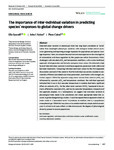The importance of inter‐individual variation in predicting species' responses to global change drivers
| dc.contributor.author | Guscelli, E | |
| dc.contributor.author | Spicer, JI | |
| dc.contributor.author | Calosi, P | |
| dc.date.accessioned | 2019-05-13T09:52:54Z | |
| dc.date.issued | 2019-04 | |
| dc.identifier.issn | 2045-7758 | |
| dc.identifier.issn | 2045-7758 | |
| dc.identifier.uri | http://hdl.handle.net/10026.1/13848 | |
| dc.description.abstract |
<jats:title>Abstract</jats:title><jats:p>Inter‐individual variation in phenotypic traits has long been considered as “noise” rather than meaningful phenotypic variation, with biological studies almost exclusively generating and reporting average responses for populations and species’ average responses. Here, we compare the use of an individual approach in the investigation of extracellular acid–base regulation by the purple sea urchin <jats:italic>Paracentrotus lividus </jats:italic>challenged with elevated <jats:italic>p</jats:italic>CO<jats:sub>2</jats:sub> and temperature conditions, with a more traditional approach which generates and formally compares mean values. We detected a high level of inter‐individual variation in acid–base regulation parameters both within and between treatments. Comparing individual and mean values for the first (apparent) dissociation constant of the coelomic fluid for individual sea urchins resulted in substantially different (calculated) acid–base parameters, and models with stronger statistical support. While the approach using means showed that coelomic <jats:italic>p</jats:italic>CO<jats:sub>2</jats:sub> was influenced by seawater <jats:italic>p</jats:italic>CO<jats:sub>2</jats:sub> and temperature combined, the individual approach indicated that it was in fact seawater temperature in isolation that had a significant effect on coelomic <jats:italic>p</jats:italic>CO<jats:sub>2</jats:sub>. On the other hand, coelomic [HCO<jats:sub>3</jats:sub><jats:sup>−</jats:sup>] appeared to be primarily affected by seawater <jats:italic>p</jats:italic>CO<jats:sub>2</jats:sub>, and less by seawater temperature, irrespective of the approach adopted. As a consequence, we suggest that individual variation in physiological traits needs to be considered, and where appropriate taken into account, in global change biology studies. It could be argued that an approach reliant on mean values is a “procedural error.” It produces an artefact, that is, a population's mean phenotype. While this may allow us to conduct relatively simple statistical analyses, it will not in all cases reflect, or take into account, the degree of (physiological) diversity present in natural populations.</jats:p> | |
| dc.format.extent | 4327-4339 | |
| dc.format.medium | Electronic-eCollection | |
| dc.language | en | |
| dc.language.iso | en | |
| dc.publisher | Wiley Open Access | |
| dc.subject | acid-base regulation | |
| dc.subject | acid-base status | |
| dc.subject | individual variation | |
| dc.subject | ocean acidification | |
| dc.subject | ocean warming | |
| dc.subject | phenotypic variation | |
| dc.title | The importance of inter‐individual variation in predicting species' responses to global change drivers | |
| dc.type | journal-article | |
| dc.type | Article | |
| plymouth.author-url | https://www.ncbi.nlm.nih.gov/pubmed/31031908 | |
| plymouth.issue | 8 | |
| plymouth.volume | 9 | |
| plymouth.publication-status | Published | |
| plymouth.journal | Ecology and Evolution | |
| dc.identifier.doi | 10.1002/ece3.4810 | |
| plymouth.organisational-group | /Plymouth | |
| plymouth.organisational-group | /Plymouth/Faculty of Science and Engineering | |
| plymouth.organisational-group | /Plymouth/Faculty of Science and Engineering/School of Biological and Marine Sciences | |
| plymouth.organisational-group | /Plymouth/REF 2021 Researchers by UoA | |
| plymouth.organisational-group | /Plymouth/REF 2021 Researchers by UoA/UoA07 Earth Systems and Environmental Sciences | |
| plymouth.organisational-group | /Plymouth/Research Groups | |
| plymouth.organisational-group | /Plymouth/Research Groups/Marine Institute | |
| plymouth.organisational-group | /Plymouth/Users by role | |
| plymouth.organisational-group | /Plymouth/Users by role/Academics | |
| dc.publisher.place | England | |
| dcterms.dateAccepted | 2018-06-15 | |
| dc.rights.embargodate | 2019-6-5 | |
| dc.identifier.eissn | 2045-7758 | |
| dc.rights.embargoperiod | Not known | |
| rioxxterms.funder | Natural Environment Research Council | |
| rioxxterms.identifier.project | Impacts of ocean acidification on key benthic ecosystems, communities, habitats, species and life cycles | |
| rioxxterms.versionofrecord | 10.1002/ece3.4810 | |
| rioxxterms.licenseref.uri | http://www.rioxx.net/licenses/all-rights-reserved | |
| rioxxterms.licenseref.startdate | 2019-04 | |
| rioxxterms.type | Journal Article/Review | |
| plymouth.funder | Impacts of ocean acidification on key benthic ecosystems, communities, habitats, species and life cycles::Natural Environment Research Council |


